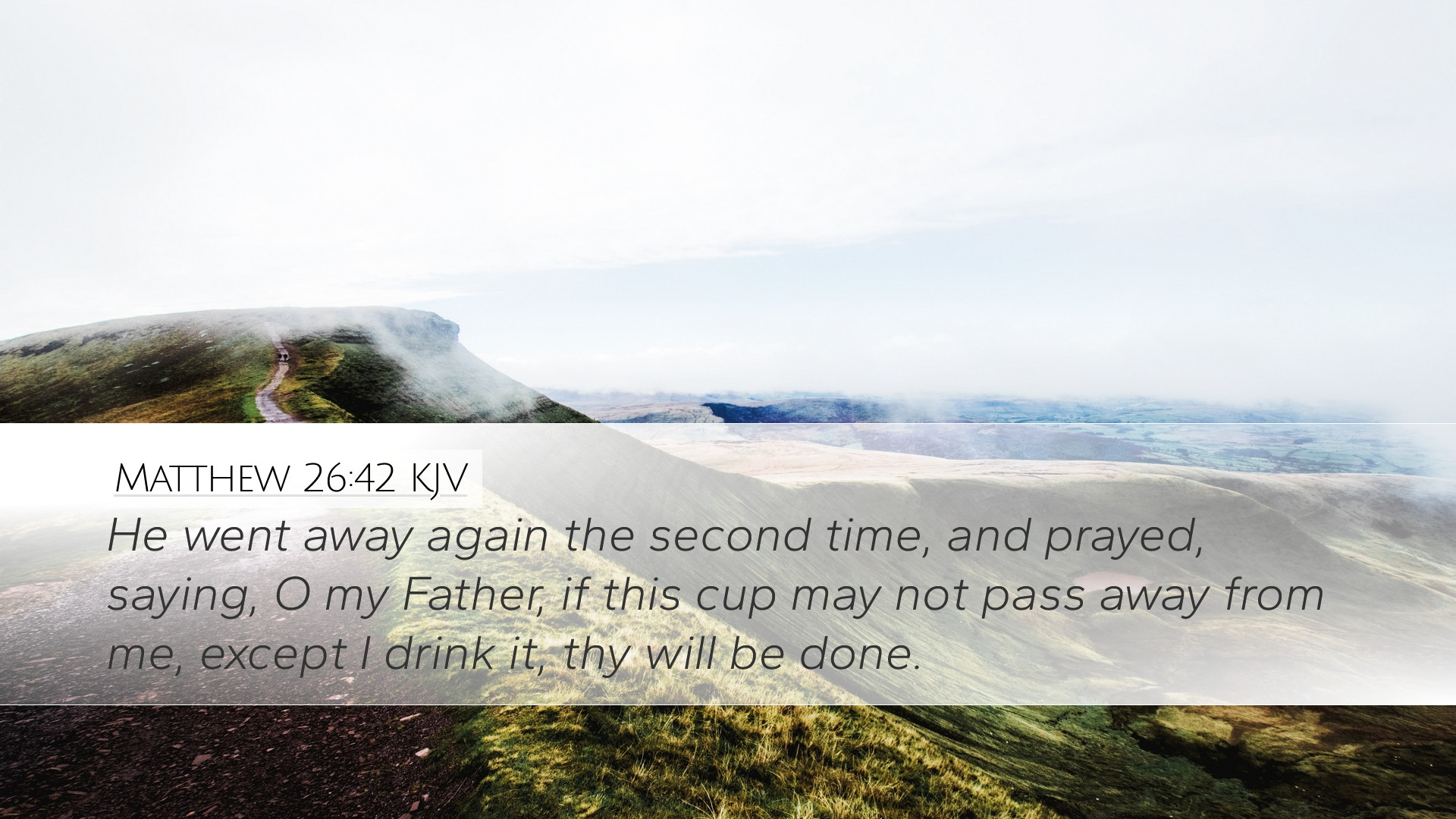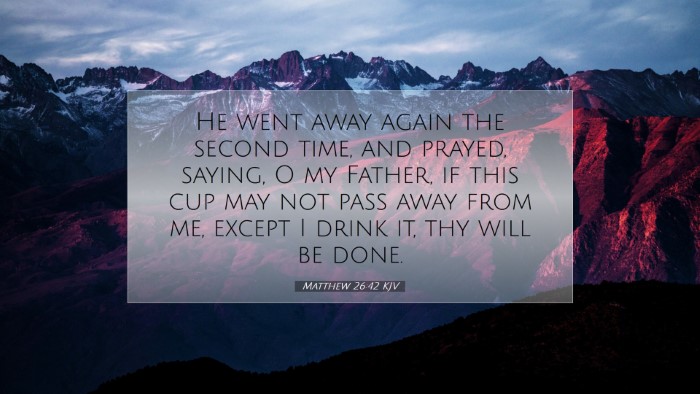Commentary on Matthew 26:42
Bible Verse: Matthew 26:42 - "He went away again the second time, and prayed, saying, O my Father, if this cup may not pass away from me, except I drink it, thy will be done."
Introduction
The agony of Gethsemane portrays a significant moment in the life of Jesus, revealing the depth of His human emotions and His unwavering commitment to the divine will. This verse encapsulates a critical point of Jesus' passion where He grapples with the enormity of His impending sacrifice, offering rich theological implications for understanding the nature of Christ and the necessity of His atoning work.
Insights from Commentators
Matthew Henry's Commentary
Matthew Henry emphasizes the struggle that Jesus experienced during His prayer in Gethsemane. He explains that the phrase "O my Father" underscores the intimate relationship Jesus had with God, as well as the weight of the burden He was about to bear. Henry notes:
- The Nature of the Cup: The "cup" represents not just physical suffering but the spiritual anguish of bearing the sins of the world. Henry draws attention to the gravity of this moment, highlighting that Jesus was fully aware of what was to come.
- Submission to God's Will: The latter part of the verse, "thy will be done," illustrates Jesus' perfect obedience. Henry points out that Jesus' submission is an example for His followers, teaching them to yield to God's plans even in the face of adversity.
Albert Barnes' Notes
Albert Barnes provides a detailed insight into the theological implications of Jesus' prayer. He elaborates on several key points:
- Two Prayers: The repetition of His prayer signifies the profound anguish Christ experienced. According to Barnes, this is a moment of deep reflection about the mission ahead of Him.
- Christ’s Humanity: Barnes emphasizes the humanity of Christ, explaining that this moment reveals His struggle with fear and dread, which are natural human responses to imminent suffering.
- Understanding 'If This Cup…': The conditional phrasing highlights Christ's desire for another way, yet His absolute commitment to fulfill the Father’s will illustrates the tension between His divine nature and His humanity.
Adam Clarke's Commentary
Adam Clarke offers a passionate analysis and provides interpretive nuances that enrich understanding:
- The Cup's Symbolism: Clarke elucidates that the cup is a metaphor for the judgment and suffering that Jesus must face. He stresses that Jesus' anguish was profoundly rooted in the realization of the wrath of God He would take upon Himself.
- Importance of Prayer: Clarke indicates the essential nature of prayer, noting that Jesus, even in His agony, resorts to prayer as a source of strength and communion with the Father, setting a model for believers.
- Human Dilemma vs. Divine Purpose: Clarke underlines the paradox in Jesus’ plea—His human reluctance contrasted with His ultimate desire to fulfill God’s redemptive purpose.
Theological Reflections
This verse not only depicts a moment of distress but serves as a profound theological statement regarding the nature of Christ’s mission. The implications here lead to several critical areas for further reflection:
- Christ's Dual Nature: The passage speaks powerfully about the dual nature of Christ—fully God and fully man. This struggle highlights His true humanity, making Him a relatable mediator for believers.
- The Dominance of Divine Will: The repeated phrase "thy will be done" serves as an essential reminder of the importance of submission to God’s will in the life of every Christian. This verse challenges believers to trust in God’s plan even when it seems difficult or incomprehensible.
- Prayer in Distress: Jesus’ example underscores the necessity of prayer in times of trial. It demonstrates that, even in suffering, turning to God can provide solace and clarity.
- The Reality of Suffering: This text acknowledges the reality of suffering and fear, validating the feelings of believers who may experience similar struggles. Jesus’ experience in Gethsemane validates human emotions while directing them toward divine reliance.
Conclusion
Matthew 26:42 provides a poignant glimpse into the heart of Jesus during His final hours before the crucifixion. By synthesizing insights from commentators like Matthew Henry, Albert Barnes, and Adam Clarke, we gain a broader understanding of the narrative's implications for theology and practice. This passage remains a powerful testament to the tension between divine sovereignty and human agony, urging both reflection and application for pastors, students, and scholars alike.


